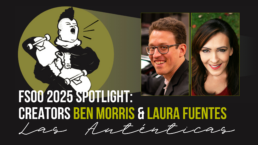Meet the composer and librettist of Las Auténticas, one of the three winning micro-operas for FSOO 2025!
Often the most poignant and powerful dialogue happens between those who create and those who perform. That’s why OOO connects our singing-artists with the composers and librettists selected for the 7th Annual Fresh Squeezed Ounce of Opera.
If you’re curious about the story inspiration, what to listen for, what to expect, and more, you’re in the right place.
Here, get the scoop behind the story of Las Auténticas, written by Benjamin Morris (composer) & Laura Fuentes (librettist) – with questions from the cast – designed to enhance your experience. Bonus: you will be among the very first to hear this work, making its Regional Premiere!
First, a quick synopsis:
“The Most Authentic Taco in LA,” eh? Join Jenny and her Tía Luz the moment they hear from the “Lord of Tortillas” himself – Esteban Eats – and prepare their food truck for a day they’ll not soon forget. ¿Porqué no hacemos unos tacos?
Is the taco truck Luz’s taco truck and Jenny is just helping her or is this the family business?
Laura: Great question — the taco truck is named “Taquería Dos Hermanas,” and we know that Luz and Jenny aren’t sisters, but rather aunt and niece. My thought was that Luz had originally been in business with her sister (possibly Jenny’s mom), and that Jenny is stepping into a role in the business later. This is another example of the theme of appearances versus reality, which ties into our theme of authenticity. At one point, I remember counting ~18 different instances of how this theme plays out across the piece in both small and large ways — see if you can spot them all! 😉
Ben: When Laura told me that Jenny’s mom was possibly the former co-owner of “Taquería Dos Hermanas,” it illuminated a moving and meaningful subtext for me personally. I lost my mom in 2015, and she was my main connection to my Norwegian heritage. Right after my mom passed, I moved to Norway for a year, and I felt a personal disconnect to my heritage and isolated from the culture. Eventually I found my own way to connect to that part of my background through music and immersion in the culture.
Although the exact details are left open, the hole left by Jenny’s mom or Luz’s sister is a strong presence in the piece. Jenny describes herself as a “distant daughter.” This is of course a metaphor, but it also raises a literal question…. Did Jenny’s mom pass away? Are they living far apart? Is their relationship strained? I think listeners can come up with their own interpretation and add layers of subtext to the story. It’s a unique and traditionally unexplored relationship in contemporary opera—an aunt and her niece, rather than a mother and daughter. I think the open-ended personal relationship between Jenny and Luz add dimensions to the piece.
I love how you explore Luz’s relationship to authenticity through punk, a genre predicated on authenticity and personal identity. Do you have a relationship to Mexican punk music, and how did that influence Luz’s character? Also, are there any cool bands I should look up?
Laura: Thanks so much! I love indie music in all its forms, and punk definitely has a special place in that scene. For Luz, I think punk fandom helps lend her a Gen X-style swagger, contrasting with Jenny’s greater self-consciousness.
In terms of recommendations, I’m a big fan of the radio show The Latin Alternative, which airs on our local independent radio station and many others nationwide. Alt.Latino is also great for keeping up to date on new music!
https://www.npr.org/podcasts/542771035/the-latin-alternative
https://www.npr.org/sections/altlatino/
Ben: I leaned into the punk music ethos in Luz’s aria, “Era Un Grapito”: there are syncopated riffs, power chords, and extended vocal lines. I think punk and opera overlap nicely — both feature big sounds and have a tinge of rebellion to them. I’m also a fan of blending and blurring genres in opera to reflect the identity of characters—in Las Auténticas, there’s Mariachi mixed with musical theatre and punk. Laura and I listened to a lot of music together as we worked on this piece, but I particularly remember hearing “Contaminado” by the band Ritmo Peligroso. It’s a cool song that blends the punk attitude with Latin percussion and brass and piano montunos.
I also closely consulted with my friend, Mexican American composer and lyricist Nevada Lozano, and Laura’s husband Sebastian, who both helped me set Spanish text in an idiomatic and respectful way.
Jenny sings about an orange tree in Nuevo León and then commiserates about having never grown one herself. Why does she latch onto this symbol specifically, and what does it mean to her?
Laura: The northeast of Mexico is a major orange-growing region, and I like the idea that Jenny’s family has a history that is tied to the land in a very tangible way. I think that as cultural diasporas become more temporally and generationally removed from their land of origin, there can sometimes be a sense of longing for grounding symbols like these. In the case of the oranges, I also wanted to invoke imagery around “one big orange” (the sun) shining over both Jenny in the US and her family’s land of origin, while the “many little ones” are all in Mexico.
Ben: Jenny’s aria “Today the Sun Rose” evokes elements of the traditional musical theatre “I want” song. When Jenny sings “I’ve never grown an orange,” she feels that she can’t own up to her identity, that she’s inauthentic, in a way, and she wants to feel connected to her heritage. I like Laura’s pastoral imagery and depict that in the music with soaring melodic phrases. It’s a nice metaphor for anyone that feels like they must “perform” their own cultural identity.
Who is Don Ernesto? Does he represent anyone in particular?
Ben: Don Ernesto is a loyal customer of Taquería Dos Hermanas. His presence on the phone bookends the opera—in the beginning, Luz is more concerned with making Don Ernesto a great taco, while Jenny is concerned with impressing Gary, or “Esteban Eats,” the judge of the Most Authentic Taco Competition, who is really a hollow social media influencer. In the end, Don Ernesto is impressed with Jenny’s taco-making efforts. It was fun to set Don Ernesto using phrases in the piano, imagining someone grumbling on the other side of a phone, giving the cast something fun to interact with rhythmically.
Laura: To me, Don Ernesto represents the most stereotypical exemplar of “authenticity,” so there’s some fun subversion in the fact that he orders his tacos with Cheez Whiz. In a way, I think Don Ernesto and Luz both feel secure enough in their cultural identities to bend convention a bit, in contrast to Jenny, who feels a profound gulf between herself and her family’s culture of origin.
Get the inside scoop from the cast – watch below!


